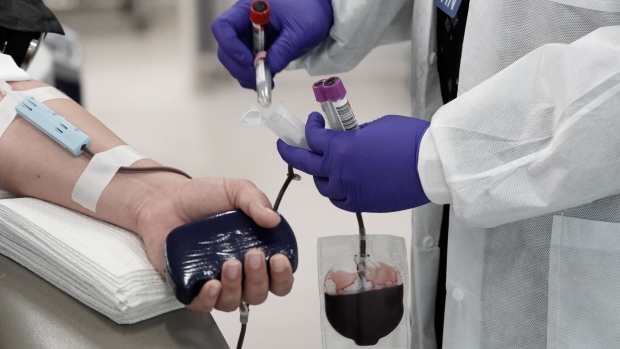Jan 27, 2023
FDA Plans to Loosen Blood Donation Rules for Gay and Bisexual Men
, Bloomberg News

(Bloomberg) -- US regulators intend to make more gay and bisexual men eligible to donate blood, a move that would reverse decades-old restrictions that other countries have already removed.
Under the current policy, all men who have sex with men must abstain for three months before donating blood. The US Food and Drug Administration is proposing that the policy be replaced by an individual risk-based assessment aimed at reducing HIV transmission, the agency said Friday.
“Maintaining a safe and adequate supply of blood and blood products in the US is paramount for the FDA,” FDA Commissioner Robert Califf said in a statement. “This proposal for an individual risk assessment, regardless of gender or sexual orientation, will enable us to continue using the best science to do so.”
In November, the FDA said that results from an agency-funded study would likely support the policy transition and that it would release more details in the coming months.
Restrictions on blood donations from men who have sex with men originated in 1983 during the height of the HIV/AIDS epidemic. In 2015, the FDA expanded eligibility to gay and bisexual men who abstained from sex for one year before donating. Amid widespread blood shortages during the pandemic, the agency shortened that period to three months.
Read more: FDA Is Poised to Ease Blood-Donor Restrictions for Gay Men
Although gay, bisexual and other men who report male-to-male sexual contact are disproportionately affected by HIV, blood banks and advocacy groups have long called for the agency to revise the regulations.
Under the proposed guidance, potential donors would be asked about their sexual relationships within the previous three months. People who have had a new sexual partner or more than one sexual partner and have had anal sex within the last three months would not be eligible, according to the FDA.
The agency is not recommending loosening the guidelines for other HIV-risk factors, including people who exchange sex for money or those with a history of non-prescription injection drug use. Blood banks are still required to test all donations for transfusion-transmitted infections, such as HIV and strains of viral hepatitis.
Other countries with similar HIV epidemiology, such as the UK and Canada, have already adopted protocols similar to the one being proposed, the FDA said.
Read more: Trust-Building Sought With FDA’s Blood Donor Policy for Gay Men
“These draft recommendations when finalized will potentially increase the number of individuals eligible to donate blood,” said Peter Marks, director of the FDA’s Center for Biologics Evaluation and Research.
Restrictions on people who take preventative HIV medication will remain in place, but the FDA will continue tracking the latest data on blood donations for this group, Marks said.
Before finalizing the guidance, the FDA will accept public comment for 60 days and then conduct another review.
(Updates with comments from FDA press call beginning in eighth paragraph.)
©2023 Bloomberg L.P.


